-
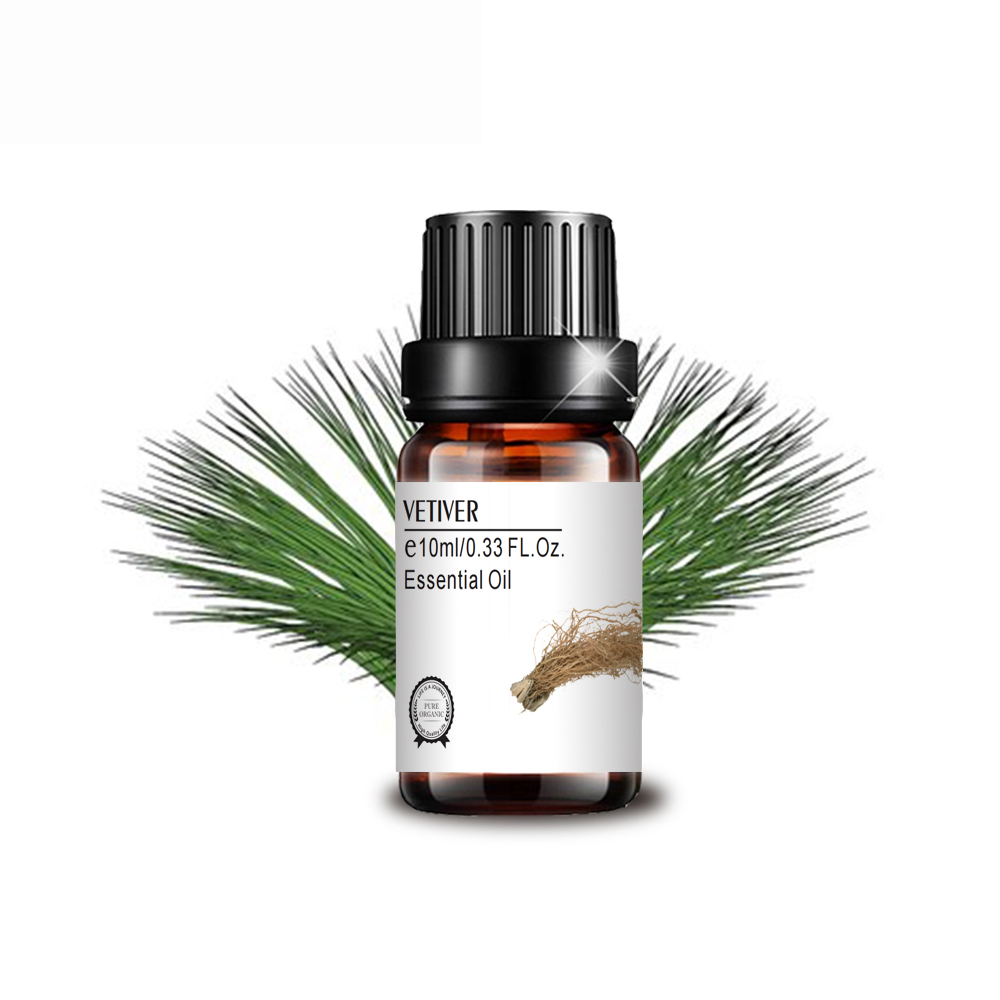
highest quality pure natural vetiver essential oil mosquito repellent skincare
BENEFITS OF VETIVER OIL
With over 100 sesquiterpene compounds and their derivatives, Vetiver Essential Oil’s composition is known to be intricate and thus somewhat complicated. The main chemical constituents of Vetiver Essential Oil are: Sesquiterpene Hydrocarbons (Cadinene), Sesquiterpene Alcohol derivatives, (Vetiverol, Khusimol), Sesquiterpene Carbonyl derivatives (Vetivone, Khusimone), and Sesquiterpene Ester derivatives (Khusinol Acetate). The main constituents that are known to influence the aroma are α-Vetivone, β-Vetivone, and Khusinol.It is believed that this scent – known for its fresh, warm yet cooling, woody, earthy, and balsamic notes – can encourage feelings of confidence, stillness, and tranquility. Its sedative properties have made it ideal for use in relieving nervousness and restoring a sense of serenity, and it is reputed to effectively diminish feelings of anger, irritability, panic and restlessness. The strengthening properties of Vetiver Oil have made it an ideal tonic that eases problems of the mind to promote restful sleep and stimulate or enhance libido. By balancing emotions to promote positive moods, it also boosts immunity. Its scent can freshen a room while deodorizing any lingering stale odors, such as those that remain after cooking or smoking.
Used cosmetically or topically in general, Vetiver Essential Oil is known to be a deeply hydrating moisturizer that firms, tightens, and protects skin against the harsh effects of environmental stressors, thereby reducing the appearance of wrinkles and exhibiting anti-aging properties. By conditioning and nourishing the skin, Vetiver Oil promotes the growth of new skin. Its regenerative properties facilitate the healing of wounds as well as the disappearance of scars, stretch marks, and acne, among other skin ailments.
Vetiver Essential Oil’s low evaporation rate and its solubility in alcohol makes it an ideal ingredient for use in perfumery. Accordingly, it has become a significant component in several perfumes offered by prominent brands. Some prevalent fragrances that incorporate Vetiver include Vetiver by Guerlain, Coco Mademoiselle by Chanel, Miss Dior by Dior, Opium by Yves Saint Laurent, and Ysatis by Givenchy.
Used medicinally, Vetiver Essential Oil works as a natural anti-oxidant that promotes relief from various types of inflammation such as that of the joints or inflammation caused by sunstroke or dehydration. “Vetiver Oil is known to relieve the body of aches and pains while easing mental and physical exhaustion as well as insomnia. Its tonic properties are reputed to have regenerative and immune-enhancing effects.”With its strengthening and grounding properties along with its comforting scent, Vetiver Oil is reputed to balance and preserve emotional well-being while enhancing concentration. This profoundly calming and relaxing effect has the added benefit of enhancing sensual moods and promoting restful sleep. When used in a therapeutic massage, the tonic properties of this oil enhance circulation and boost the metabolism as well as digestion. Its anti-septic properties are known to facilitate the healing of wounds by eliminating and preventing the growth of harmful bacteria.
-
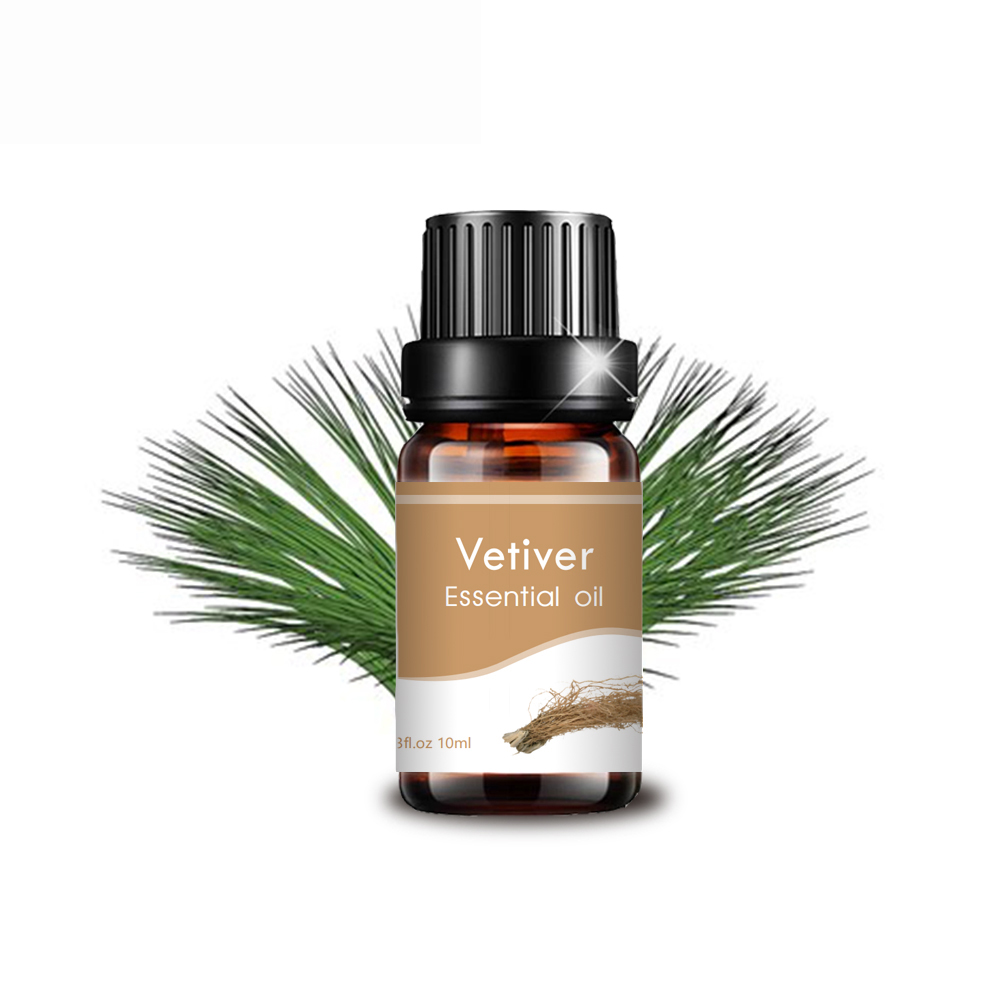
100% pure natural 10ml vetiver essential oil for purify skin massage diffuser
What is vetiver?
It’s an essential oil renowned for its grounding, calming and stabilising properties.
Also referred to askhus oil, vetiver oil is made from a perennial grass that’s native to India.1
Part of the Poaceae plant family, vetiver grass (Chrysopogon zizanioides) can grow up to 1.5 metres tall and has tall stems and long, thin, rigid leaves and purple/brown flowers.
It also happens to be related to other fragrant grasses, namely lemongrass and citronella.2
The name vetiver, Vetiveria Zizanioides in full, means ‘hatcheted’ up in the parts of India where it’s native to.
Vetiver grass thrives in sandy loam or clay loam soil and climates that are tropical, sub-tropical or Mediterranean.
The plant is indigenous to India, Pakistan, Bangladesh, Sri Lanka and Malaysia.
It can also be found in many other tropical regions, including Brazil, Jamaica, Africa, Indonesia, Japan and Australia.
How is vetiver oil made?
Like most essential oils, vetiver is made from the process of steam distillation, which involves vetiver roots.
This process has been used for many centuries, with vetiver oil dating as far back as the 12th century, when it was a taxable item in its native India.
The vetiver roots tend to be harvested for oil when the grass is around 18 to 24 months old.
Interestingly, there is no synthetic version of vetiver essential oil because it has such a complex scent profile, which is made up of more than 100 components, making vetiver oil that even more special.3
What does vetiver smell like?
Highly distinctive.
Some people describe it as woody, smoky, earthy and spicy. While others say it smells dry and leathery.
It’s also been said to smell quite a lot like patchouli too.
Because of its woody, smoky, almost rugged, smell vetiver is often classed as being more of a masculine scent and is widely used in colognes and other scented products for men.4
Men’s fragrances that contain vetiver include Creed Original Vetiver, Carven Vetiver, Annick Goutal Vetiver, Guerlain Vetiver Extreme, Il Profumo Vetiver de Java, Prada Infusion de Vetiver, Lacoste Red Style in Play and Tim McGraw Southern Blend.
Meanwhile, perfumes that contain vetiver include Chanel Sycomore, Lancome Hypnose, Nina Ricci L’Air du Temps, Yves Saint Laurent Rive Gauche and DKNY Delicious Night.
Handpicked content: What is patchouli: Benefits, risks and uses
Summary
- Vetiver essential oil is made from the vetiver grass plant (Chrysopogon zizanioides) that’s native to India
- The oil is extracted from vetiver roots using steam distillation
- It has an extremely distinctive, masculine smell that’s woody, smoky, earthy and spicy
-

high quality pure bulk factory supply lemongrass oil mosquito repellent
Lemongrass Essential Oil Benefits & Uses
What is lemongrass essential oil used for? There are so many potential lemongrass essential oil uses and benefits so let’s dive into them now! Some of the most common benefits of lemongrass essential oil include:
1. Natural Deodorizer and Cleaner
Use lemongrass oil as a natural and safe air freshener or deodorizer. You can add the oil to water and use it as a mist or use an oil diffuser or vaporizer. By adding other essential oils, like lavender or tea tree oil, you can customize your own natural fragrance.
Cleaning with lemongrass essential oil is another great idea because not only does it naturally deodorize your home, but it also helps to sanitize it.
2. Skin Health
Is lemongrass oil good for skin? One major lemongrass essential oil benefit is its skin healing properties. One research study tested the effects of a lemongrass infusion on the skin of animal subjects; the infusion is made by pouring boiling water over dried lemongrass leaves. The infusion was used on the paws of rats in order to test lemongrass as a sedative. The pain-killing activity suggests that lemongrass can be used to soothe irritations on the skin.
Add lemongrass oil to shampoos, conditioners, deodorants, soaps and lotions. Lemongrass oil is an effective cleanser for all skin types; its antiseptic and astringent properties make lemongrass oil perfect for getting even and glowing skin, and thus part of your natural skin care routine. It can sterilize your pores, serve as a natural toner and strengthen your skin tissues. By rubbing this oil into your hair, scalp and body, you can alleviate headaches or muscle pain.
3. Hair Health
Lemongrass oil can strengthen your hair follicles, so if you are struggling with hair loss or an itchy and irritated scalp, massage a few drops of lemongrass oil into your scalp for two minutes and then rinse. The soothing and bacteria-killing properties will leave your hair shiny, fresh and odor-free.
4. Natural Bug Repellant
Because of its high citral and geraniol content, lemongrass oil is known to repel bugs such as mosquitoes and ants. This natural repellant has a mild smell and can be sprayed directly on the skin. You can even use lemongrass oil to kill fleas; add about five drops of oil to water and create your own spray, then apply the spray to your pet’s coat.
5. Stress and Anxiety Reducer
Lemongrass is one of several essential oils for anxiety. The calming and mild smell of lemongrass oil is known to relieve anxiety and irritability.
A study published in the Journal of Alternative and Complimentary Medicine reveals that when subjects were exposed to an anxiety-causing situation and smelled the scent of lemongrass oil (three and six drops), unlike the control groups, the lemongrass group experienced a decrease in anxiety and subjective tension, immediately after treatment administration.
To relieve stress, create your own lemongrass massage oil or add lemongrass oil to your body lotion. You can also try having a cup of lemongrass tea at night before bed to experience calming lemongrass tea benefits.
6. Muscle Relaxer
Have sore muscles or are you experiencing cramps or muscle spasms? Lemongrass oil benefits also include its ability to help relieve muscle aches, cramps and spasms. (7) It may also help to improve circulation.
Try rubbing diluted lemongrass oil on your body or make your own lemongrass oil foot bath. Check out some of the DIY recipes below.
7. Detoxifying Antifungal Abilities
Lemongrass oil or tea has been used as a detoxifier in several countries. It is known to detox the digestive tract, liver, kidneys, bladder and pancreas. Because it works as a natural diuretic, consuming lemongrass oil will help you to flush harmful toxins out of your body.Keep your system clean by adding lemongrass oil to your soup or tea. You can make your own lemongrass tea by infusing lemongrass leaves with boiling water or adding a few drops of essential oil to your tea.
One study was done to test the effects that lemongrass oil has on fungal infections and yeast from Candida albicans species. Candida is a fungal infection that can affect the skin, genitals, throat, mouth, and blood. By using disk diffusion tests, lemongrass oil was studied for its antifungal properties, and research shows that lemongrass oil has a potent in vitro activity against candida.
This study suggests that lemongrass oil and its key active component, citral, have the power to reduce fungal infections; specifically those caused by Candida albicans fungus.
8. Menstrual Cramp Relief
Drinking lemongrass tea is known to help women with menstrual cramps; it can also help with nausea and irritability.
Drink one to two cups of lemongrass tea a day to relieve pain associated with your period. There’s no scientific research on this use, but lemongrass is known to be soothing internally and stress reducing, so it makes sense why it may help with painful cramps.
9. Stomach Helper
Lemongrass has been known for centuries anecdotally as a cure for stomach distress, gastritis and gastric ulcers. Now research is catching up with this long known support and cure.
A research study published in 2012 shows how lemongrass essential oil (Cymbopogon citratus) was able to protect the stomachs of animal subjects from gastric damage caused by ethanol and aspirin. The study concludes that lemongrass oil “might serve as a lead compound for future development of novel therapies that combat nonsteroidal anti-inflammatory drug-associated gastropathy.”
Adding lemongrass oil to tea or soup can also help to improve stomach pains and diarrhea.
10. Headache Relief
Lemongrass oil is also often recommended for relief from headaches. The calming and soothing effects of lemongrass oil has the power to relieve the pain, pressure, or tension that can cause headaches.
Try massaging diluted lemongrass oil on your temples and breathe in the relaxing lemony fragrance.
-
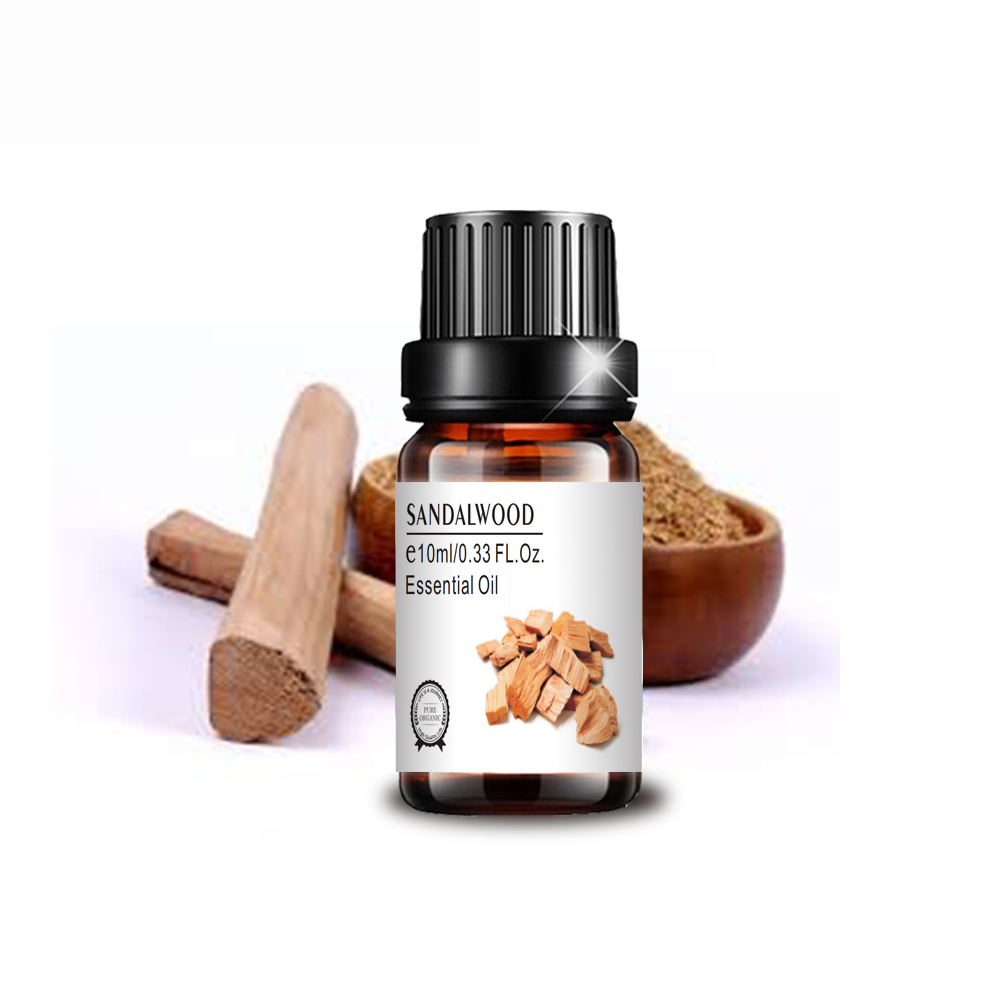
OEM ODM customization 10ml pure aromatherapy perfume pure sandalwood oil
What Is Sandalwood Essential Oil?
Sandalwood oil is commonly known for its woodsy, sweet smell. It is frequently used as a base for products such as incense, perfumes, cosmetics and aftershave. It also easily blends well with other oils.Traditionally, sandalwood oil is a part of religious traditions in India and other Eastern countries. The sandalwood tree itself is considered holy. The tree is used for various religious ceremonies including weddings and births.
Sandalwood oil is one of the most expensive essential oils available on the market today. The highest quality sandalwood is the Indian variety, known as Santalum album. Hawaii and Australia also produce sandalwood, but it’s not considered to be of the same quality and purity as the Indian variety.
In order to get the most benefit from this essential oil, the sandalwood tree must grow for at least 40–80 years before the roots can be harvested. An older, more mature sandalwood tree typically produces an essential oil with a stronger smell. The use of steam distillation or CO2 extraction extracts the oil from the mature roots. Steam distillation uses heat, which can kill a lot of compounds that make oils like sandalwood so great. Look for CO2-extracted oil, which means it was extracted with as little heat as possible.
Sandalwood oil contains two primary active components, alpha- and beta-santalol. These molecules produce the strong fragrance associated with sandalwood. Alpha-santalol specifically has been evaluated for multiple health benefits. Some of these benefits include improving blood glucose control in animal subjects, decreasing inflammation and helping to reduce the proliferation of skin cancer.
Sandalwood’s benefits are numerous, but there are a few that particularly stand out. Let’s take a look at those now!
Sandalwood Essential Oil Benefits
1. Mental clarity
One of the primary sandalwood benefits is that it promotes mental clarity when used in aromatherapy or as a fragrance. This is why it’s often used for meditation, prayer, or other spiritual rituals.A study published in the international journal Planta Medica evaluated the effect of sandalwood oil on attention and arousal levels. The researchers found that sandalwood’s main compound, alpha-santalol, generated high ratings of attentiveness and mood.
Inhale some sandalwood oil next time you have a big deadline that requires mental focus, but you still want to remain calm during the process.
2. Relaxing and calming
Along with lavender and chamomile, sandalwood commonly makes the list of essentials oils used in aromatherapy to relieve anxiety, stress and depression.A study published in the Journal of Complementary Therapies in Clinical Practice found that patients who were receiving palliative care felt much more relaxed and less anxious when they received aromatherapy with sandalwood prior to receiving care, compared to patients who did not receive sandalwood.
3. Natural aphrodisiac
Practitioners of Ayurvedic medicine traditionally use sandalwood as an aphrodisiac. Since it’s a natural substance that can increase sexual desire, sandalwood helps to increase libido and may help men with impotence.To use sandalwood oil as a natural aphrodisiac, trying adding a couple of drops to massage oil or topical lotion.
4. Astringent
Sandalwood is a mild astringent, meaning it can induce minor contractions in our soft tissues, such as gums and skin. Many aftershaves and facial toners use sandalwood as one of their primary ingredients to help soothe, tighten, and cleanse the skin.If you’re looking for an astringent effect from your natural body care products, you can add a couple of drops of sandalwood oil. Many people also use sandalwood oil to fight acne and dark spots.
5. Anti-viral and antiseptic
Sandalwood is an excellent anti-viral agent. It has been found to be beneficial to prevent replication of common viruses, such as herpes simplex viruses-1 and -2.Other uses include the reduction of inflammation from mild skin irritation such as superficial wounds, pimples, warts or boils. Just make sure to always test the oil on a small area before applying it directly to the skin or mix it with a base carrier oil first.
If you have a sore throat, you can also gargle with a cup of water with a few drops of anti-viral sandalwood oil added to it.
6. Anti-inflammatory
Sandalwood is also an anti-inflammatory agent that may provide relief from mild inflammation such as insect bites, contact irritations or other skin conditions.A 2014 study found that the active compounds in sandalwood can decrease inflammation markers in the body called cytokines. It is believed that these active compounds (santalols) act in a similar manner as NSAID medications minus the potential negative side effects.
-
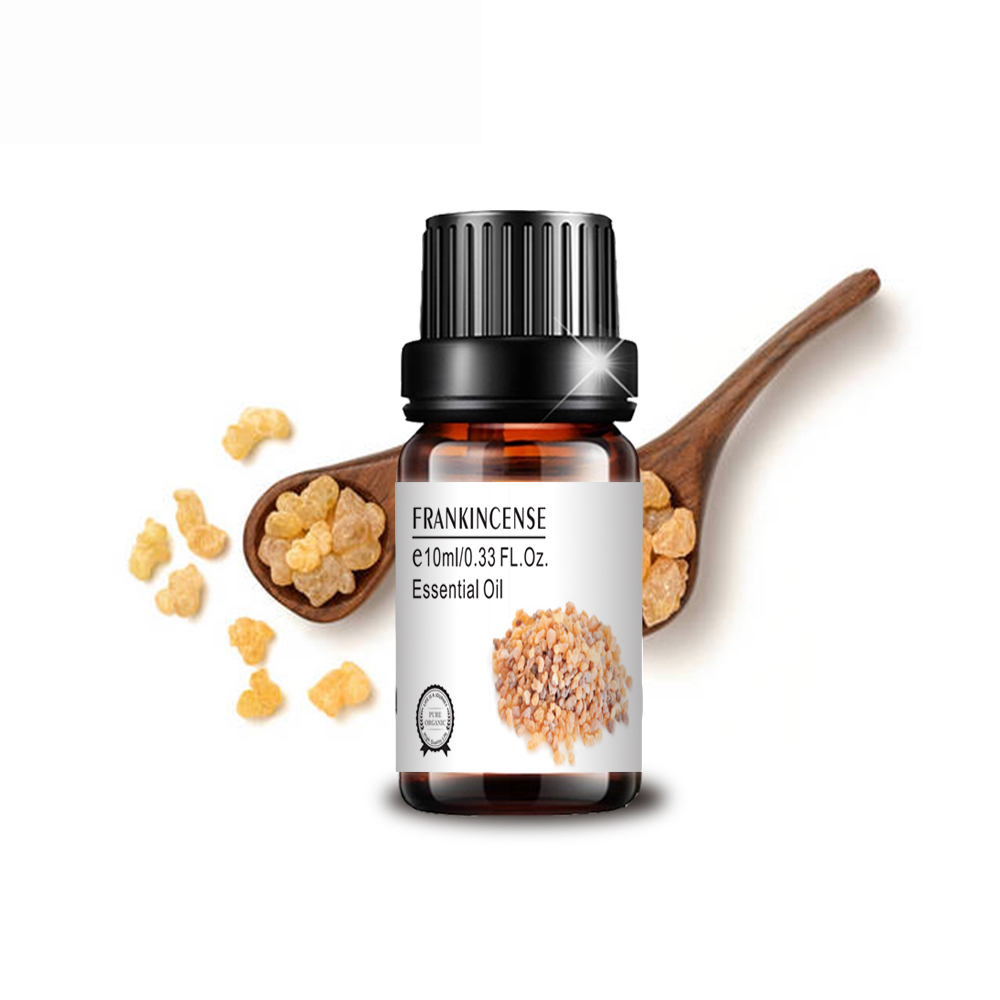
Certificated 100% pure natural 10ml aromatherapy frankincense essential oil
What Is Frankincense Essential Oil?
Frankincense oil is from the genus Boswellia and sourced from the resin of the Boswellia carterii, Boswellia frereana or Boswellia serrata trees that’s commonly grown in Somalia and regions of Pakistan. These trees are different from many others in that they can grow with very little soil in dry and desolate conditions.
The word frankincense comes from the term “franc encens,” which means quality incense in old French. Frankincense has been associated with many different religions over the years, especially the Christian religion, as it was one of the first gifts given to Jesus by the wise men.
What does frankincense smell like? It smells like a combination of pine, lemon and woody scents.
Boswellia serrata is a tree native to India that produces special compounds that have been found to have strong anti-inflammatory, and potentially anti-cancer, effects. Among the valuable boswellia tree extracts that researchers have identified, several stand out as most beneficial, including terpenes and boswellic acids, which are strongly anti-inflammatory and protective over healthy cells.
Related: Blue Tansy Oil Benefits for Skin & Beyond (+ How to Use)
Top 10 Benefits of Frankincense Oil
1. Helps Reduce Stress Reactions and Negative Emotions
When inhaled, frankincense oil been shown to reduce heart rate and high blood pressure. It has anti-anxiety and depression-reducing abilities, but unlike prescription medications, it does not have negative side effects or cause unwanted drowsiness.
A 2019 study found that compounds in frankincense, incensole and incensole acetate, have the ability to activate ion channels in the brain to alleviate anxiety or depression.
In a study involving mice, burning boswellia resin as incense had antidepressive effects: “Incensole acetate, an incense component, elicits psychoactivity by activating TRPV3 channels in the brain.”
Researchers suggest that this channel in the brain is implicated in the perception of warmth in the skin.
2. Helps Boost Immune System Function and Prevents Illness
Studies have demonstrated that frankincense benefits extend to immune-enhancing abilities that may help destroy dangerous bacteria, viruses and even cancers. Researchers at Mansoura University in Egypt conducted a lab study and found that frankincense oil exhibits strong immunostimulant activity.
It can be used to prevent germs from forming on the skin, mouth or in your home. This is the reason many people choose to use frankincense to naturally relieve oral health problems.
The antiseptic qualities of this oil may help prevent gingivitis, bad breath, cavities, toothaches, mouth sores and other infections from occurring, which has been shown in studies involving patients with plaque-induced gingivitis.
3. May Help Fight Cancer and Deal with Chemotherapy Side Effects
Several research groups have found that frankincense has promising anti-inflammatory and anti-tumor effects when tested in lab studies and on animals. Frankincense oil has been shown to help fight cells of specific types of cancer.
Researchers in China investigated the anticancer effects of frankincense and myrrh oils on five tumor cells lines in a lab study. The results showed that human breast and skin cancer cell lines showed increased sensitivity to the combination of myrrh and frankincense essential oils.
A 2012 study even found that a chemical compound found in frankincense called AKBA is successful at killing cancer cells that have become resistant to chemotherapy, which may make it a potential natural cancer treatment.
4. Astringent and Can Kill Harmful Germs and Bacteria
Frankincense is an antiseptic and disinfectant agent that has antimicrobial effects. It has the ability to eliminate cold and flu germs from the home and the body naturally, and it can be used in place of chemical household cleaners.
A lab study published in Letters in Applied Microbiology suggests that the combination of frankincense oil and myrrh oil is particularly effective when used against pathogens. These two oils, which have been used in combination since 1500 BC, have synergistic and additive properties when exposed to microorganisms like Cryptococcus neoformans and Pseudomonas aeruginosa.
5. Protects Skin and Prevents Signs of Aging
Frankincense benefits include the ability to strengthen skin and improve its tone, elasticity, defense mechanisms against bacteria or blemishes, and appearance as someone ages. It may help tone and lift skin, reduce the appearance of scars and acne, and treat wounds.
It may also be beneficial for fading stretch marks, surgery scars or marks associated with pregnancy, and healing dry or cracked skin.
A review published in the Journal of Traditional and Complementary Medicine indicates that frankincense oil reduces redness and skin irritation, while also producing a more even skin tone. Studies suggest that it’s the pentacyclic triterpene (steroid-like) structure of frankincense oil that contributes to its soothing effect on irritated skin.
6. Improves Memory
Research suggests that frankincense oil can be used to improve memory and learning functions. Some animal studies even show that using frankincense during pregnancy may increase the memory of a mother’s offspring.
In one such study, when pregnant rats received frankincense orally during their gestation period, there was a significant increase in the power of learning, short-term memory and long-term memory of their offspring.
-
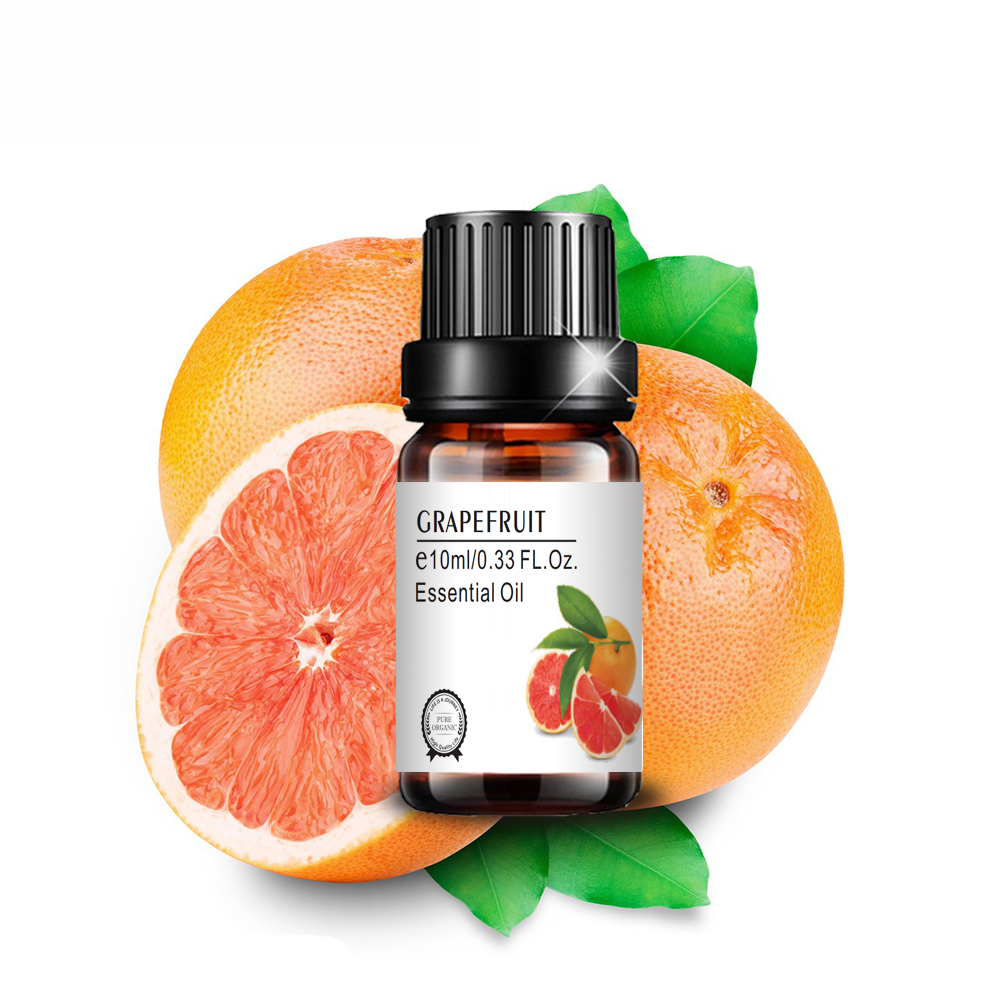
custom private label grapefruit essential oil for massage aromatherapy
What Is Grapefruit Essential Oil?
Grapefruit essential oil is a potent extract derived from the Citrus paradisi grapefruit plant.
Grapefruit essential oil benefits include:
- Disinfecting surfaces
- Cleansing the body
- Reducing depression
- Stimulating the immune system
- Decreasing fluid retention
- Curbing sugar cravings
- Helping with weight loss
Grapefruit oil is naturally high in antioxidants and phytochemicals that reduce oxidative stress and disease-causing inflammation. Many of grapefruit essential oil’s benefits are due to one of its main constituents called limonene (which makes up about 88 percent to 95 percent of the oil). Limonene is known to be a tumor-fighting, cancer-preventative phytochemical that protects DNA and cells from damage. In addition to limonene, grapefruit essential oil contains other powerful antioxidants, including vitamin C, myrcene, terpinene, pinene and citronellol.
Most commonly, grapefruit oil is used to fight throat and respiratory infections, fatigue, muscle aches, as well as a natural remedy for arthritis. It’s also been used consistently by those working to lose weight. It’s said to help increase energy levels and metabolism, plus it also can help curb sugar cravings.
As a natural detoxification agent, grapefruit oil can help the liver cleanse the body of toxins and waste, plus it can activate your lymphatic system and control fluid retention.
11 Grapefruit Essential Oil Benefits
1. Helps to Boost Weight Loss
Ever been told that grapefruit is one of the best fruits to eat for weight loss and fat-burning? Well, that’s because some of grapefruit’s active ingredients work to boost your metabolism and reduce your appetite. When inhaled or applied topically, grapefruit oil is known to lower cravings and hunger, which makes it a great tool for losing weight fast in a healthy way. Of course, using grapefruit oil alone isn’t going to make all the difference — but when it’s combined with dietary and lifestyle changes, it can be beneficial.
Grapefruit essential oil also works as an excellent diuretic and lymphatic stimulant. This is one reason why it’s included in many cellulite creams and blends that are used for dry brushing. Additionally, grapefruit can be very effective for shedding excess water weight loss since it helps kick-start a sluggish lymphatic system.
Researchers from the Nagata University School of Medicine in Japan found that grapefruit has a “refreshing and exciting effect” when inhaled, which suggests an activation of sympathetic nerve activity that helps control body weight.
In their animal study, the researchers found that grapefruit’s activation of sympathetic nerve activity has an effect on white adipose tissue within the body that’s responsible for lipolysis. When rats inhaled the grapefruit oil, they experienced increased lipolysis, which resulted in a suppression in body weight gain.
2. Works as Natural Antibacterial Agent
Grapefruit oil has antimicrobial effects that help reduce or eliminate harmful strains of bacteria that enter the body through contaminated foods, water or parasites. Research shows that grapefruit oil can even fight strong bacterial strains that are responsible for food-born illnesses, including E. Coli and salmonella.
Grapefruit is also used to kill skin or internal bacteria and fungus, fight mold growth, kill parasites in animal feeds, preserve food, and disinfect water.
A lab study published in the Journal of Alternative and Complementary Medicine found that when grapefruit-seed extract was tested against 67 distinct biotypes that were both gram-positive and gram-negative organisms, it showed antibacterial properties against all of them.
3. Helps to Reduce Stress
The smell of grapefruit is uplifting, soothing and clarifying. It’s known to relieve stress and bring on feelings of peace and relaxation.
Research suggests that inhaling grapefruit oil or using it for aromatherapy within your home can help turn on relaxation responses within the brain and even lower your blood pressure naturally. Inhaling grapefruit vapors can quickly and directly transmit messages to your brain region involved in controlling emotional responses.
A 2002 study published in the Journal of Japanese Pharmacology investigated the effects of grapefruit oil fragrance inhalation on sympathetic brain activity in normal adults and found that grapefruit oil (along with other essential oils like peppermint oil, estragon, fennel and rose essential oil) significantly affected brain activity and relaxation.
The adults who inhaled the oils experienced a 1.5- to 2.5-fold increase in relative sympathetic activity that improved their mood and reduced stressful feelings. They also experienced a noticeable reduction in systolic blood pressure compared with inhalation of an odorless solvent.
4. Helps to Relieve Hangover Symptoms
Grapefruit oil is a powerful gallbladder and liver stimulant, so it can help stop headaches, cravings and sluggishness following a day of drinking alcohol. It works to increase detoxification and urination, while putting a hold on cravings that can occur due to hormonal and blood sugar level changes resulting from alcohol.
5. Reduces Sugar Cravings
Feel like you’re always looking for something sweet? Grapefruit oil may help to reduce sugar cravings and help kick that sugar addiction. Limonene, one of the primary components in grapefruit oil, has shown to balance blood sugar levels and reduce appetite in studies involving rats. Animal studies also show that grapefruit oil affects the autonomic nervous system, which acts to regulate unconscious bodily functions, including functions related to how we handle stress and digestion.
6. Boosts Circulation and Reduces Inflammation
Therapeutic-grade citrus essential oils are known for their ability to help lower inflammation and increase blood flow. The blood vessel-dilating effects of grapefruit may be useful as a natural remedy for PMS cramps, headaches, bloating, fatigue and muscle pains.
Research suggests that the limonene present in grapefruit and other citrus essential oils is what helps to reduce inflammation and helps to regulate the body’s cytokine production, or its natural immune response.
7. Aids Digestion
Increased blood to the digestive organs — including the bladder, liver, stomach and kidneys — means that grapefruit oil also helps with detoxification. It has a positive effect on digestion, can help you shed fluid retention, and fights microbes within the intestines, gut and other digestive organs.
A scientific review published in the Journal of Nutrition and Metabolism found that drinking grapefruit juice helps to promote metabolic detoxification pathways. Grapefruit may work similarly if it’s taken internally with water in small amounts, but there are no human studies to prove this yet.
-
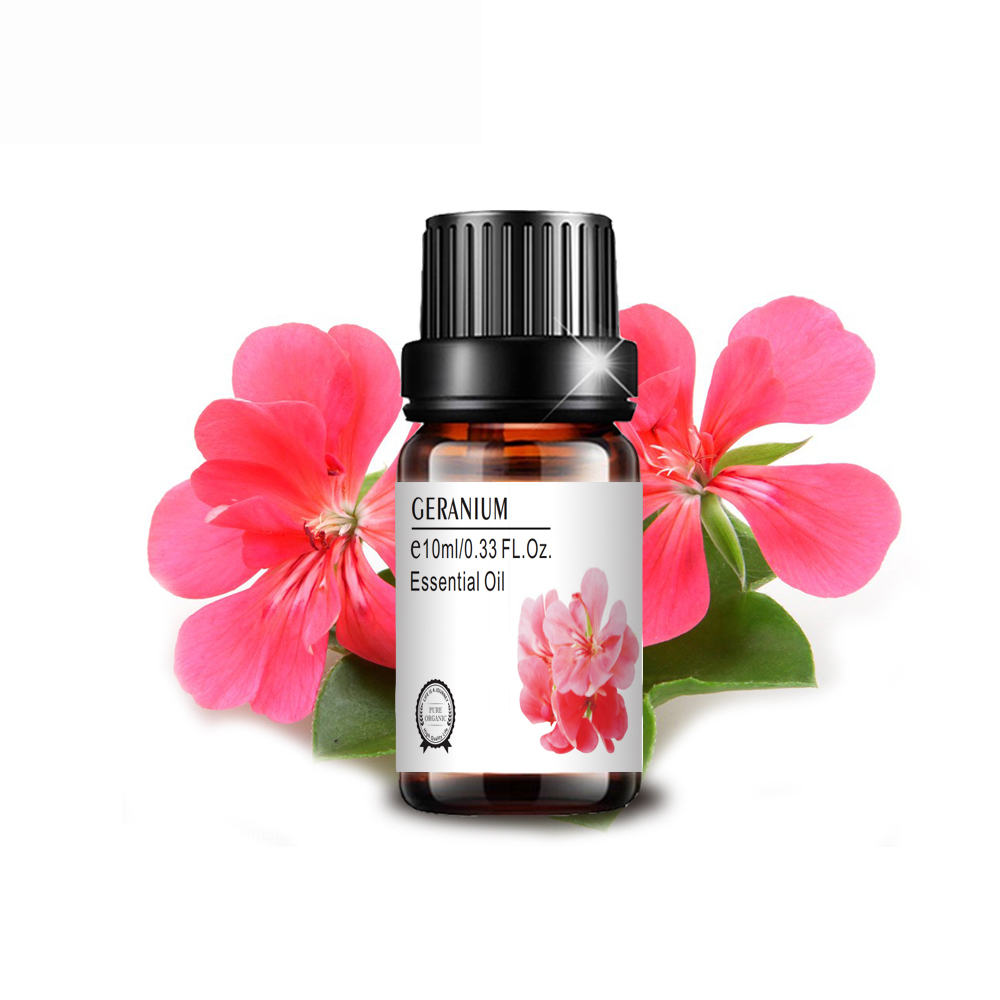
100% pure natural cosmetics grade private label wholesale geranium essential oil
What Is Geranium Oil?
Geranium oil is extracted from the stems, leaves and flowers of the geranium plant. Geranium oil is considered nontoxic, nonirritant and generally non-sensitizing — and the therapeutic properties of it include being an antidepressant, an antiseptic and wound-healing. Geranium oil may also be one of the best oils for such a variety of very common skin including oily or congested skin, eczema, and dermatitis.
Is there a difference between geranium oil and rose geranium oil? If you’re comparing rose geranium oil vs. geranium oil, both oils come from the Pelargonium graveolens plant, but they are derived from different varieties. Rose geranium has the full botanical name Pelargonium graveolens var. Roseum while geranium oil is simply known as Pelargonium graveolens. The two oils are extremely similar in terms of active components and benefits, but some people prefer the scent of one oil over the other.
The main chemical constituents of geranium oil include eugenol, geranic, citronellol, geraniol, linalool, citronellyl formate, citral, myrtenol, terpineol, methone and sabinene.
What is geranium oil good for? Some of the most common geranium essential oil uses include:
- Hormone balance
- Stress relief
- Depression
- Inflammation
- Circulation
- Menopause
- Dental health
- Blood pressure reduction
- Skin health
When an essential oil like geranium oil can address serious health issues like these, then you need to try it! This is a natural and safe tool that will improve your skin, mood and internal health.
Geranium Oil Uses & Benefits
1. Wrinkle Reducer
Rose geranium oil is known for its dermatological use for the treatment of aging, wrinkled and/or dry skin. It has the power to minimize the look of wrinkles because it tightens facial skin and slows down the effects of aging.
Add two drops of geranium oil to your face lotion and apply it twice daily. After a week or two, you may just see the look of your wrinkles begin to fade away.
2. Muscle Helper
Are you sore from an intense workout? Using some geranium oil topically may help with any muscle cramps, aches and/or pains plaguing your sore body.
Create a massage oil by mixing five drops of geranium oil with one tablespoon of jojoba oil and massage it into your skin, focusing on your muscles.
3. Infection Fighter
Research has shown that geranium oil has potent antibacterial and anti-fungal abilities against at least 24 different types of bacteria and fungi.These antibacterial and anti-fungal properties found in geranium oil can help to protect your body from infection. When you use geranium oil to fight external infection, your immune system can focus on your internal functions and keep you healthier.
To help prevent infection, apply two drops of geranium oil combined with a carrier oil like coconut oil to the area of concern, such as a cut or wound, twice a day until it has healed.
Athlete’s foot, for example, is a fungal infection that can be helped with the use of geranium oil. To do this, add give drops of geranium oil to a foot bath with warm water and sea salt; do this twice daily for the best results.
-
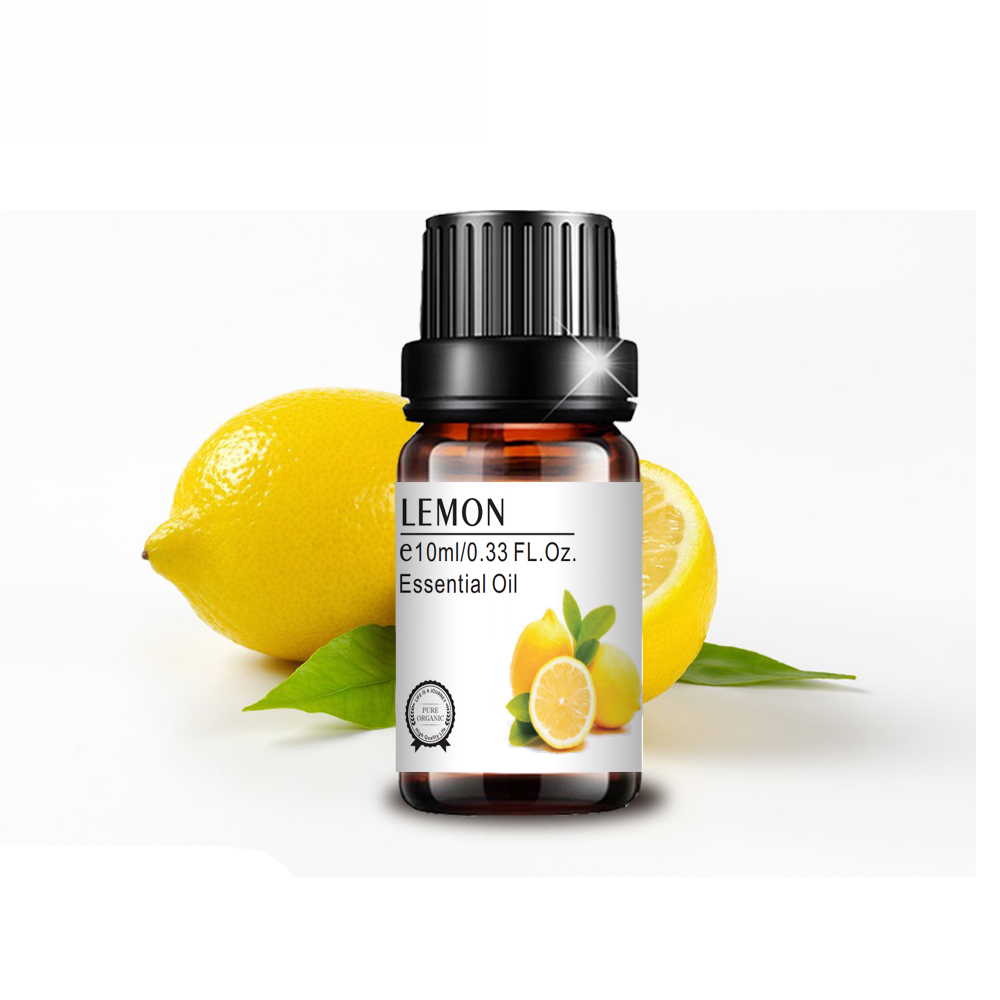
factory supply cosmetic grade private label lemon essential oil full of vatamin C
WHAT ARE THE BENEFITS OF LEMON OIL FOR SKIN?
Lemon essential oil has been found to have a variety of uses for skin, from sunburns and insect bites to wrinkles. Lemon oils can help to refine the complexion especially for oily skin types that are prone to large pores, as lemon has astringent properties.
Lemon essential oil benefits make it a versatile ingredient when used in the cosmetics industry. It has antibacterial, antiviral, anti-fungal, and astringent properties, and so due to its purifying properties lemon oil can be used as an effective ingredient in a variety of cosmetic beauty preparations especially wash off products including soaps, cleansers and hair care products.
The use of lemon essential oil in skincare products can help fight free radicals that may lead to premature aging of the skin. When used as an ingredient in cosmetic skincare formulation, the high number of antioxidants the lemon oil provides (which help fight against these pesky free-radicals) combined with its natural astringent, anti-bacterial properties makes it a very useful essential oil for very oily congested skins on the search for a brighter more clear looking radiance to the complexion.
Its antiseptic and antibacterial qualities also make lemon oil very effective in cleansing small abrasions, cuts and wounds on the skin, and also treating some microbial skin problems. In particular the anti-fungal properties of lemon essential oil can make it an effective ingredient when blended and applied topically in the treatment of fungal and yeast infections such as athlete’s foot.
Lemon essential oil is also a great natural, non-toxic way to deter insects such as mosquitoes and ticks when added to a mist or toner to create an organic insect repellant spray.
IS LEMON OIL GOOD FOR OILY SKIN?
The lemon tree’s leaves and fruit contain a high level of citric acid, limonene and pinene, which is highly effective at killing bacteria. This makes lemon oil an excellent ingredient to choose when formulating cleansers, body washes and soaps, as it can help to keep your pores clear while removing the bacteria, something that is important for helping those with acne-prone and oily skin types.
Lemon oil has been proven when blended with other essential oils such as Lavender essential oil and Chamomile essential oils to help calm inflammation and reduce redness. It is also has astringent properties helping to tighten the skin and close pores preventing further blockages from becoming inflamed.
CAN YOU APPLY LEMON ESSENTIAL OIL DIRECTLY TO SKIN?
Lemon essential can only be applied directly to the skin when mixed with carrier oils (such as jojoba oil or olive oil) to dilute the potency of the oil before application on the skin, in particularly the face, neck and chest.
Like many other citrus essential oils (e.g. bergamot essential oil, lime essential oil etc) lemon essential oil is phototoxic, meaning that lemon essential oil may cause skin to become irritated and and/or damaged through sun exposure, or when exposed to other UV ray sources such as sun-beds. The use of lemon essential oil in leave on products should be limited if to used regularly and during the daytime to reduce any possibility of reaction.
-

manufacturer aromatherapy fragrance pure natural ylang ylang essential oil
Ylang Ylang oil Product Description
The Ylang Ylang flower has been used for centuries in perfumes, religious ceremonies, aromatherapy, and wedding events, and the essential oil produced from this blossom is just as versatile. The many uses and benefits of Ylang Ylang oil can be obtained when used aromatically, topically, and internally. When ingested, Ylang Ylang essential oil has the powerful ability to provide antioxidant support, which makes it a cherished oil for bodily health.* Ylang Ylang is frequently used for its external benefits and can promote the appearance of healthy skin and hair. The popular fragrance of Ylang Ylang oil is often used in perfumes and aromatherapy treatments due to its rich scent and its calming and lifting effect on the mood.
Ylang Ylang Uses and Benefits
- Help transform your dreary mood to a cheery mood by using Ylang Ylang essential oil. Whenever you are feeling down or stressed, apply a few drops of Ylang Ylang essential oil to the back of your neck for a calming and uplifting effect. Due to one of Ylang Ylang oil’s main chemical constituents, germacrene, the oil contains natural abilities to soothe. Ylang Ylang is also known for its uplifting effects and is a great oil to apply when in need of an elevating boost.
- Don’t let the damaging heat of the summer prevent your hair from looking healthy and strong. Instead, use Ylang Ylang essential oil. Ylang Ylang oil is loaded with organic components that promote the appearance of healthy hair. To protect your hair from looking beat by the summer heat, massage Ylang Ylang into your scalp to increase the appearance of healthy, shiny hair.
- Fill your home with the rich and sweet scents of the tropical Ylang Ylang flower. This yellow, star-shaped flower is a gem of the aroma industry and its essential oil can be used to create a relaxing atmosphere. To obtain these delightful aromatic benefits, add a few drops of Ylang Ylang to your diffuser. This rich aroma will not just smell good, it will also lift your mood and promote a calming effect.
- Soak your stresses away with an incredible bath that will invigorate your senses and promote relaxation. For an ultimate bath experience, put Ylang Ylang essential oil into an Epsom salt bath. Due to the calming and soothing properties of Ylang Ylang oil, this bath will be just what you need to help you unwind after a long day.
- Are you struggling to see the bright side of things? Use Ylang Ylang essential oil aromatically or topically for a more optimistic perspective. Ylang Ylang is a powerful uplifting component and helps promote a positive outlook.
- Create the perfect massage blend for de-stressing with Ylang Ylang essential oil. Massages are a great way to help relax tense muscles and feelings and incorporating Ylang Ylang into your massage will provide the ultimate relaxing experience. Ylang Ylang is known and valued for its ability to soothe and calm the mood while also providing an uplifting effect. To create a powerful and effective massage blend that helps reduce the effects of daily stresses, add several drops of Ylang Ylang to Coconut Oil and massage into your back and shoulders.
- Avoid the harmful chemicals found in deep hair conditioners and deep hair conditioning treatments, and go natural! Create your very own natural deep hair conditioner by adding Ylang Ylang essential oil to Fractionated Coconut Oil and applying it to your hair. Ylang Ylang oil contains great hair benefits that will leave your hair looking healthy and beautiful!
- Give your skin a little TLC with a Ylang Ylang essential oil aromatherapy steam facial. Steam facials are great for your skin. The heat from the steam helps open pores and, in the process, release bacteria and dirt from your skin. Including Ylang Ylang in your steam facial will help promote healthy looking skin and will also add a sweet scent to your DIY facial care.
- Ylang Ylang’s rich scent is well loved and has been used extensively for making perfumes. For a wonderful-smelling, natural perfume, put a drop or two of Ylang Ylang on your wrists. This perfume will also give off a soothing and calming aroma.
- Help transform your dreary mood to a cheery mood by using Ylang Ylang essential oil. Whenever you are feeling down or stressed, apply a few drops of Ylang Ylang essential oil to the back of your neck for a calming and uplifting effect. Due to one of Ylang Ylang oil’s main chemical constituents, germacrene, the oil contains natural abilities to soothe. Ylang Ylang is also known for its uplifting effects and is a great oil to apply when in need of an elevating boost.
-
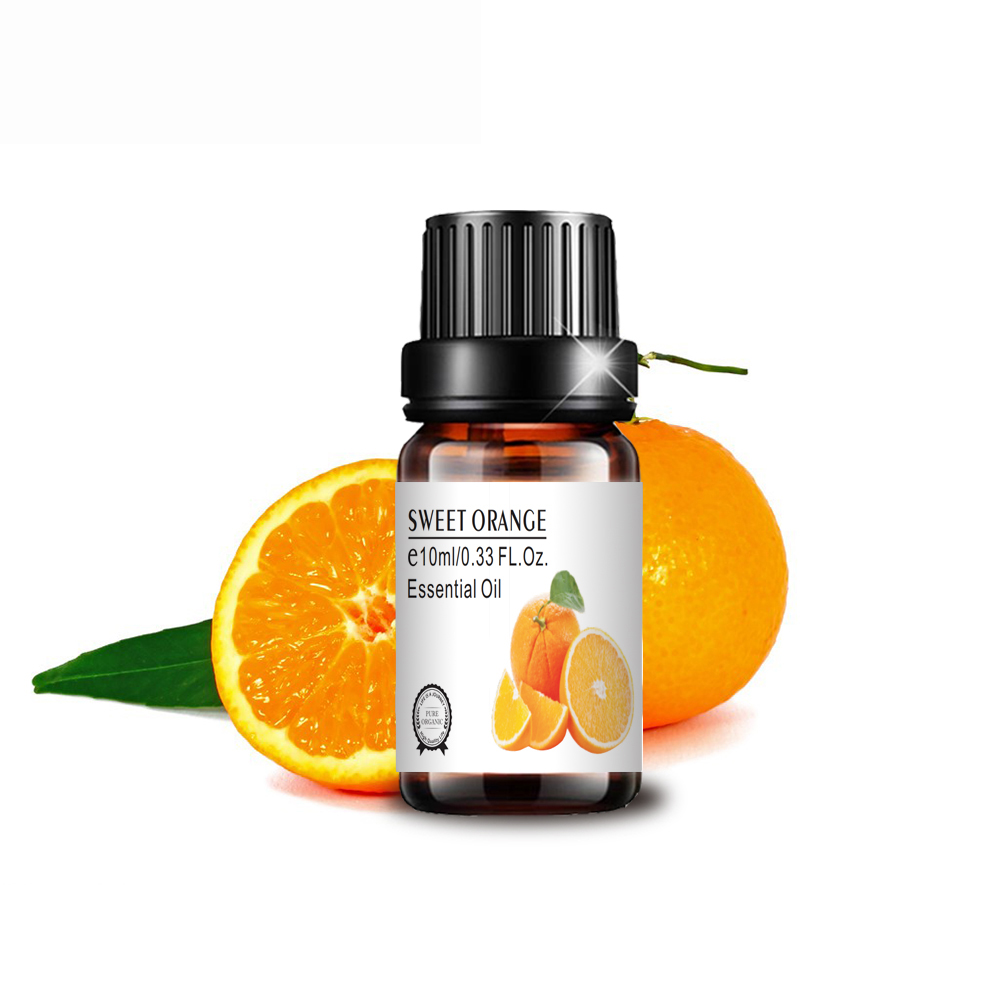
factory directly supply new 10ml sweet orange essential oil in bulk price for perfume
In addition to an irresistible aroma, sweet orange essential oil offers many benefits for skin. Sweet orange oil is produced from the peel of oranges.
The sweet-smelling aroma uplifts your mood and makes you feel better. The fresh scent is one of “Mother Nature’s” most potent antidepressants in aromatherapy. The mood-enhancing smell of sweet orange eases stress and anxiety to leave you calm and in control!
Essential oils are the concentrated oils from plants, fruits, and herbs that are extracted by distillation. The distillation process uses water or steam to extract the oils from various parts of the plant or the peel from fruit (citrus fruits such as lemon, grapefruit, and orange) without losing any of the beneficial properties.
SWEET ORANGE ESSENTIAL OIL BENEFITS
Sweet orange, or Citrus sinensis, is the fruit that produces this beneficial essential oil commonly used in various skincare products for its aroma and its antioxidant and antiseptic properties.
The benefits of the humble orange oil go along way in protecting the skin from free radicals and healing it from acne. This essential oil is one of the most effective for keeping your skin clean and clear of acne. So, what are the benefits of sweet orange essential oil?
- Reduces dark spots and blemishes via vitamin C
- Fights off free radicals to prevent premature skin aging
- Antibacterial properties help fight acne
- Boosts circulation in the skin
- Promotes cell growth and collagen synthesis
- Shrinks large pores and firms skin (astringent)
- Controls excess oil formed on the skin
- Serves as anti-depressant and anti-anxiety in aromatherapy
- Has antiseptic healing properties
Adding this oil into your regimen can help to heal and protect the epidermis from infection from bacteria, and the lovely smell will help motivate you to use the product consistently!
BENEFITS OF SWEET ORANGE ESSENTIAL OIL FOR ACNE
Acne is created by your sebaceous glands producing too much oil and clogging your pores, which leads to the development of a bacteria called Propionibacterium acnes.
The strong antibacterial properties of sweet orange essential oil help to heal the skin from a breakout of acne. The enzymes in the orange oil keep the skin clean and blemish free. The oil has antiseptic properties that help to prevent bacteria from spreading further and leading to more acne.
Sweet orange essential oil works well for all skin types: oily, dry, and combination skin. Citrus oils help to remove excess sebum from the skin and keep it in balance.
SWEET ORANGE ESSENTIAL OIL FOR A CLEAR MIND
Although essential oils are not a cure for depression or anxiety, they can help ease the symptoms that go with this illness. Using essential oils such as sweet orange oil can lift your mood, calm your mind, and help you sleep better.
As the aroma of sweet orange is known to be soothing, relaxing, and balancing, making it perfect for evening use or anytime you need to de-stress and get centered.
One symptom that indicates anxiety is a lack of energy and motivation. So, as sweet orange brings higher levels of energy, the incentive to do something increases and it becomes easier to move forward.
ANTI-AGING EFFECTS OF SWEET ORANGE ESSENTIAL OIL
Aging is inevitable, but you can slow down the signs of aging by using natural skincare products whenever you can. A natural skincare product that has sweet orange oil as one of the ingredients will help to reduce wrinkles, tighten facial pores, reduce dark spots, plump up fine lines, and restore your skin’s suppleness and elasticity.
A REMINDER TO BOOST YOUR SKIN’S MOISTURE
Sweet orange oil in any beauty routine should also be paired with tons of moisture to balance out the astringent aspect and saturate skin with much-needed hydration. Moisture locks in your skin’s water.
As you age, your natural levels of moisture drop. This is where natural moisturizing products can help. Regular moisturizing of the skin can help to improve your overall complexion.
Once your skin’s moisture has stabilized, it will become smoother. Keeping your skin moisturized will enhance the skin cell rejuvenation that sweet orange oil can promote. This plan can help you prevent fine lines and wrinkles from appearing.
A NOTE ON THE PHOTOTOXICITY OF CITRUS ESSENTIAL OILS
Just remember, while sweet orange oil is not considered phototoxic, a few citrus fruit oils (lemon, lime, bitter orange, bergamot etc.) can cause phototoxicity, meaning they’re best applied at night.
Phototoxic oils can increase the danger to skin when it is exposed to the sun, making it more prone to sunburn than usual. If you are using a lot of products at the same time (or using a lot of a single product) with citrus oils, you absolutely must use sunscreen during the day to protect against UV damage!
The beneficial effects of sweet orange essential oil in your natural skincare product will clear your mind and body to leave you refreshed and ready for the day ahead.
-
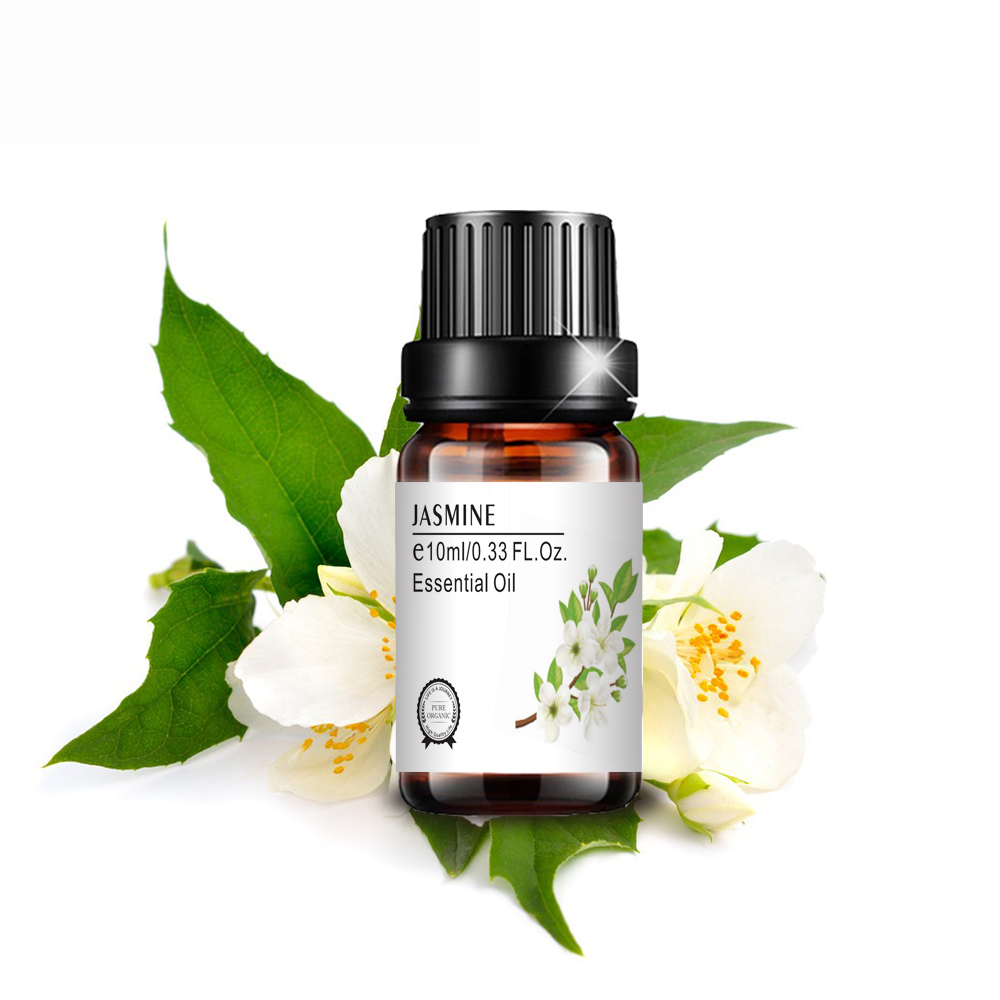
private label 100% pure natural skin care 10ml jasmine essential oil for massage
Jasmine oil, a type of essential oil derived from the jasmine flower, is a popular natural remedy for improving mood, overcoming stress and balancing hormones. Jasmine oil has been used for hundreds of years in parts of Asia as a natural remedy for depression, anxiety, emotional stress, low libido and insomnia.
Research suggests that jasmine oil, which has genus species name Jasminum officinale, works by positively influencing the nervous system. Through aromatherapy or by penetrating the skin, the oils from the jasmine flower have an effect on a number of biological factors — including heart rate, body temperature, stress response, alertness, blood pressure and breathing.
Many people refer to jasmine oil as a natural aphrodisiac because it’s said to have a “seductive” scent that can increase sensuality. In fact, jasmine oil is sometimes nicknamed “queen of the night” — both because of the strong smell of jasmine flower at night and also because of its libido-boosting qualities.
What Is Jasmine Oil?
Traditionally, jasmine oil has been used in places like China to help the body detox and relieve respiratory and liver disorders. It’s also used to decrease pain associated with pregnancy and childbirth. Here are some of the most well-researched and loved benefits of jasmine oil today:
- Dealing with stress
- Reducing anxiety
- Fighting depression
- Increasing alertness
- Helping to fight low energy or chronic fatigue syndrome
- Reducing menopausal symptoms and working as a natural remedy for PMS and cramps
- Helping with sleep
- Acting as an aphrodisiac
How can you use jasmine oil?
- It can either be inhaled through the nose or applied directly to the skin.
- It doesn’t need to be combined with a carrier oil and instead is recommended to be used undiluted for the best results.
- You can also diffuse it in your home or combine it with other lotions, moisturizing coconut oil or essential oils for many different household and body uses — like homemade massage oil, body scrubs, soaps and candles, for example.
- You can combine it with other essential oils to create a homemade perfume (recipe included in this article). What scents blend well with jasmine? Citrus oils, lavender and more!
11 Jasmine Oil Uses & Benefits
1. Depression and Anxiety Relief
Many studies have found improvements in mood and sleep after using jasmine oil either as an aromatherapy treatment or topically on the skin, as well as it being a way to boost energy levels. Results demonstrate that jasmine oil has a stimulating/activating effect of the brain and also helps improve mood at the same time.
A study published in Natural Product Communications found that jasmine oil used on the skin over an eight-week period helped participants feel an improvement in their moods and a decrease in both physical and emotional signs of low energy.
2. Increase Arousal
Compared with a placebo, jasmine oil caused significant increases of physical signs of arousal — such as breathing rate, body temperature, blood oxygen saturation, and systolic and diastolic blood pressure — in a study done on healthy adult women. Subjects in the jasmine oil group also rated themselves as more alert and more vigorous than subjects in the control group. The study results indicate that jasmine oil can increase autonomic arousal activity and help elevate mood at the same time.
3. Improve Immunity and Fight Infections
Jasmine oil is believed to have antiviral, antibiotic and antifungal properties that make it effective for boosting immunity and fighting illness. In fact, jasmine oil has been used as a folk medicine treatment for fighting hepatitis, various internal infections, plus respiratory and skin disorders for hundreds of years in Thailand, China and other Asian countries. In vitro and in vivo animal studies show that oleuropein, a secoiridoid glycoside found in jasmine oil, is one of the oil’s primary active ingredients that can fight harmful infections and increase immune function.
Jasmine oil has also specifically been shown to have antimicrobial activity towards the bacteria that causes staph infections and the fungus that causes candida.
Inhaling jasmine oil, either directly or by infusing it in your home, can help clear mucus and bacteria within the nasal passages and respiratory symptom. Applying it to your skin can also reduce inflammation, redness, pain and speed up time needed to heal wounds.
4. Help with Falling Sleep
Feel like you’re always tired but have trouble getting good sleep? Jasmine oil exhibits a calming effect that can act as a natural sedative and help you sleep better.
A study published in the European Journal of Applied Physiology found that jasmine tea odor had sedative effects on both autonomic nerve activity and mood states. Inhaling jasmine along with lavender helped reduce heart rate and bring on feelings of calm and relaxation, which are all important for dosing off and avoiding restless nights.
To diffuse jasmine oil in your home, combine several drops in a diffuser along with other soothing oils, like lavender oil or frankincense oil.
5. Decrease Symptoms of Menopause
Using jasmine oil either as an aromatherapy treatment or applying it directly to the skin can help decrease emotional and physical symptoms of menopause and work as a natural remedy for menopause relief.
In a study published in the Journal of Evidence-Based Complementary and Alternative Medicine, when menopausal women applied jasmine oil to their skin over an eight-week period, they showed improvements in energy levels, mood and menopause-related symptoms, including hot flashes, pain and depression, compared to women who weren’t using jasmine oil.
6. Prevent or Improve PMS Symptoms
Studies show that jasmine oil is among a group of essential oils that help balance hormone levels by acting as phytoestrogens, plant constituents with a phenolic structure similar to estrogen. This gives therapeutic-grade oils, including jasmine oil, the ability to help correct PMS, menopause and other hormone-related issues.
For example, after testing women for 11 common symptoms related to hormone fluctuations — including insomnia, nervousness, weakness and headaches — researchers found that aromatherapy and massage with phytoestrogen oils helped decrease symptoms without causing any negative side effects.
Massaging jasmine oil onto your skin or inhaling it can help to reduce PMS symptoms, including headaches, stomach cramps, acne and other skin flair-ups or restlessness.
-
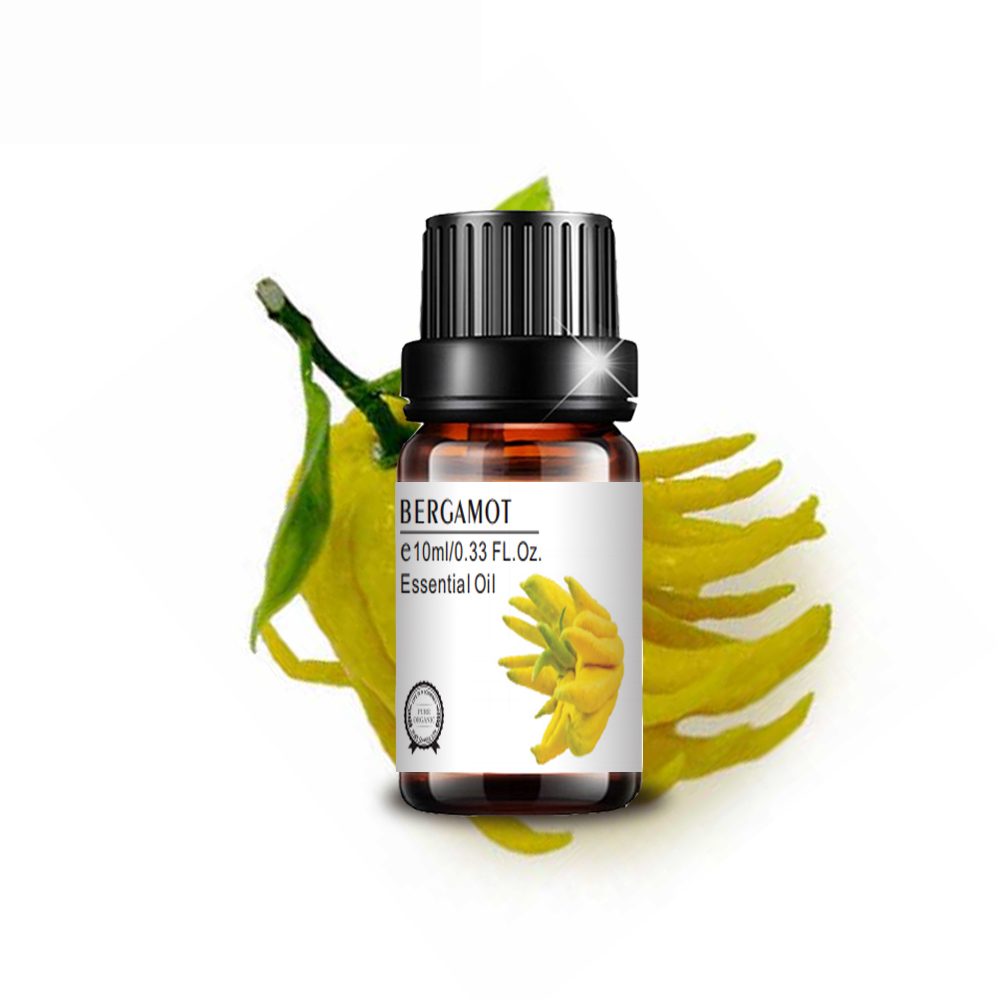
manufacturer new diffuser aromatherapy fragrance pure natural bergamot oil
Known to build confidence and enhance your mood, bergamot oil is one of the best essential oils for depression and it helps to alleviate stress and anxiety. In Traditional Chinese Medicine, bergamot is used to help with the flow of vital energy so the digestive system can work properly, and it’s also used to prevent the growth of bacteria, relieve muscle pain and boost the health of your skin. Yes, this is no one-trick pony!
Not only does bergamot oil boast some very impressive health benefits, it’s also one of the main constituents for manufacturing perfumes due to its ability to balance the mix of aromas and harmonize all of the essences, thereby enhancing the fragrance. It’s also used by the pharmaceutical industry, both to absorb the unpleasant smells of medicinal products and for its antiseptic and antibacterial properties.
If you are looking for a sweet, yet spicy, citrus-like fragrance that will leave you feeling calm, confident and at peace, then give bergamot oil a try. It’s benefits go far beyond it’s ability to boost your mood, too, with its positive effects on your cardiovascular, digestive and respiratory systems.
What Is Bergamot Essential Oil?
Where does bergamot oil come from? Bergamot is a plant that produces a type of citrus fruit and its scientific name is Citrus bergamia. It’s defined as a hybrid between a sour orange and lemon, or a mutation of lemon.
The oil is taken from the peel of the fruit and used to make medicine. Bergamot essential oil, like other essential oils, can be steam-distilled or extracted through liquid CO2 (known as “cold” extraction); many experts support the idea that cold extraction helps to preserve more active compounds in essential oils that may be destroyed by the high heat of steam distillation. The oil is commonly used in black tea, which is called Earl Grey.
Although its roots can be traced back to Southeast Asia, bergamot was more widely cultivated in the southern part of Italy. Bergamot essential oil was even named after the city of Bergamo in Lombardy, Italy, where it was originally sold. And in folk Italian medicine, bergamot was used for reducing fever, fighting parasitic diseases and relieving sore throat. Bergamot oil is also produced in the Ivory Coast, Argentina, Turkey, Brazil and Morocco.
There are a number of a surprising health benefits from using bergamot essential oil as a natural remedy. Bergamot oil is antibacterial, anti-infectious, anti-inflammatory and antispasmodic. It’s uplifting, improves your digestion and keeps your system working properly.
Bergamot Oil Benefits and uses
1. Helps to Relieve Depression
There are many signs of depression, including fatigue, sad mood, low sex drive, lack of appetite, feelings of helplessness and disinterest in common activities. Each person experiences this mental health condition in a different way. The good news is that there are natural remedies for depression that are effective and get to the root cause of the problem. This includes components of bergamot essential oil, which have antidepressant and stimulating qualities. Bergamot is known for its ability to promote cheerfulness, feelings of freshness and increased energy by improving the circulation of your blood.
A study conducted in 2011 suggests that applying blended essential oils to participants helps in treating symptoms of depression and anxiety. For this study, the blended essential oils consisted of bergamot and lavender oils, and participants were analyzed based on their blood pressure, pulse rates, breathing rates and skin temperature. In addition, subjects had to rate their emotional condition in terms of relaxation, vigor, calmness, attentiveness, mood and alertness in order to assess behavioral changes.
Participants in the experimental group applied the essential oil blend topically to the skin of their abdomens. Compared with the placebo, blended essential oils caused significant decreases of pulse rate and blood pressure. At the emotional level, subjects in the blended essential oils group rated themselves as “more calm” and “more relaxed” than subjects in the control group. The investigation demonstrates the relaxing effect of a mixture of lavender and bergamot oils, and it provides evidence for its use in medicine for treating depression or anxiety in humans.
And a 2017 pilot study found that when bergamot oil was inhaled for 15 minutes by women in the waiting room of a mental health treatment center. Researchers found that bergamot exposure improved the positive feelings of participants in the experimental group.
To use bergamot oil for depression and mood changes, rub 1–2 drops into your hands and cupping your mouth and nose, breathe in the scent of the oil slowly. You can also try rubbing 2–3 drops of bergamot on your stomach, back of neck and feet, or diffusing 5 drops at home or work.
2. Helps Lower Blood Pressure
Bergamot oil helps maintain proper metabolic rates by stimulating hormonal secretions, digestive juices, bile and insulin. This aids the digestive system and enables proper absorption of nutrients. These juices also assimilate the breakdown of sugar and can lower blood pressure.
A 2006 study involving 52 patients with hypertension indicates that bergamot oil, in combination with lavender and ylang ylang, can be used to reduce psychological stress responses, serum cortisol levels and blood pressure levels. The three essential oils were blended and inhaled daily for four weeks by patients with hypertension. Researchers found that the blood pressure, pulse, stress and anxiety levels, and cortisol levels were significantly different than those found in the placebo and control groups.
To help reduce your blood pressure and pulse rate, diffuse 5 drops of bergamot at home or work, or apply 2–3 drops topically to your temples and abdomen.
3. Prevents and Fights Infections
Bergamot oil is used in skin soaps because it helps to inhibit the growth of bacteria and fungi. According to a review published in Frontiers in Pharmacology, it has been reported that bergamot essential oil can inhibit the growth of Campylobacter jejuni, Escherichia coli, Listeria monocytogenes, Bacillus cereus and Staphylococcus aureus.
In vitro studies also show that bergamot oil may play a potential role in the topical treatment of Candida infections. And, in addition to this, lab studies indicate that components of bergamot, most notably linalool, is effective against common foodborne pathogens.
To take advantage of this amazing benefit, diffuse 5 drops of bergamot or apply 2–3 drops topically to your throat, abdomen and feet.
4. Relieves Stress and Anxiety
Bergamot oil is a relaxant — it reduces nervous tension, and works as a stress reliever and natural remedy for anxiety. A study published in Complementary Medicine Research indicates that when healthy females are exposed to bergamot oil vapors, they displayed psychological and physiological effects.
The volunteers were exposed to three experimental setups: rest alone, rest and water vapor, and rest and bergamot essential oil vapor for 15 minutes. Saliva samples were collected immediately after each setup and the volunteers completed profiles on their current mood, anxiety levels and fatigue levels.
Researchers found that the salivary cortisol levels were significantly lower in the bergamot group than in the rest alone group, and the bergamot group had improved negative emotions and fatigue scores. It was concluded that inhaling bergamot essential oil vapors exerts psychological and physiological effects in a relatively short period of time. No wonder bergamot is one of the top essential oils for anxiety.
To relieve stress and anxiety using bergamot oil, diffuse 5 drops at home or work, inhale the oil directly from the bottle or apply 2–3 drops topically to your temples and back of neck. You can also try my DIY Stress Reducing Solution that’s made with bergamot, lavender, frankincense and myrrh essential oils.
5. Alleviates Pain
Bergamot oil is a great way to reduce the symptoms of sprains, muscle aches and headaches. Instead of relying on pain killers that have nasty side effects, use this safe and natural oil to reduce pain and tension.
Research shows that bergamot oil has analgesic effects and can be used in complementary medicine to minimize tension in the body. And a review of pharmacological studies published in the International Journal of Molecular Sciences found that linalool — a component found in bergamot, lavender and rosewood oils — possesses several pharmacological activities, including anti-inflammatory, analgesic and anticonvulsant effects. Researchers believe that this may be linalool’s ability to block effects on pain receptors and inhibit the release of substance P, a compound that’s involved in the transmission of pain and other nerve impulses.
To reduce pain, rub five drops of bergamot oil on sore muscles or where you feel tension. To cover a larger surface area, combine bergamot with a carrier oil like coconut oil.
6. Boosts Skin Health
Bergamot oil has soothing, antiseptic, antibacterial and anti-inflammatory properties, so it works well to boost the health of your skin when applied topically. Bergamot essential oil can be used to get rid of scars and marks on the skin, tone the skin and soothe skin irritations. In Italian folk medicine, it was used to facilitate wound healing and was added to homemade skin disinfectants.
To improve the health of your skin or promote healing, put five drops of bergamot oil on a cotton ball or pad and rub it on the infected area. You can also add 10 drops of bergamot oil to your warm bath water — the benefits of a bergamot oil bath go way beyond your skin. It’s great for your mood and reducing built-up tension.

